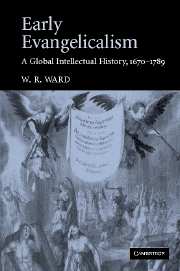Book contents
- Frontmatter
- Contents
- Acknowledgements
- Introduction
- 1 The thought-world of early evangelicalism
- 2 Spener and the origins of church pietism
- 3 The mystic way or the mystic ways?
- 4 The development of pietism in the Reformed churches
- 5 The Reformed tradition in Britain and America
- 6 Zinzendorf
- 7 John Wesley
- 8 Jonathan Edwards
- 9 The disintegration of the old evangelicalism
- Conclusion
- Select and user-friendly bibliography
- Index
2 - Spener and the origins of church pietism
Published online by Cambridge University Press: 19 July 2009
- Frontmatter
- Contents
- Acknowledgements
- Introduction
- 1 The thought-world of early evangelicalism
- 2 Spener and the origins of church pietism
- 3 The mystic way or the mystic ways?
- 4 The development of pietism in the Reformed churches
- 5 The Reformed tradition in Britain and America
- 6 Zinzendorf
- 7 John Wesley
- 8 Jonathan Edwards
- 9 The disintegration of the old evangelicalism
- Conclusion
- Select and user-friendly bibliography
- Index
Summary
Arndt offered his own version of what the English Puritan Lewis Bayley called the ‘practice of piety’ as a solution to the ills of the church; but many who subsequently called on his name were sure that there was no solution to the ills of the Babel that masqueraded as an ecclesiastical establishment. There were Behmenists of various degrees of radicalism, anti-war prophets, and spiritualists like Christian Hoburg who sought in mysticism an alternative to the ‘school-way’ of confessional Word- and Wind-theology with its Aristotelian methods and its passion for polemic. Mingled with these rather vociferous advocates of peace were assorted mystics, Paracelsists, alchemists, cabbalists, and enthusiastic prophets of judgement drawing in various proportions from the wells described in the last chapter. Their history was recorded by Gottfried Arnold in his Kirchen und Ketzerhistorie but has never as a whole been scientifically written. They were nevertheless continually in the background to the work of Philipp Jakob Spener (1635–1705), himself the offspring of the impeccably Orthodox university of Strasbourg. He it was who distilled the piety of Arndt and the theology of Orthodoxy into a policy of church reform. And he was never able to lose touch with such sources of spiritual vitality as the radical underworld possessed or to escape the reproaches of the unyielding Orthodox that what he proposed must lead to schism.
- Type
- Chapter
- Information
- Early EvangelicalismA Global Intellectual History, 1670–1789, pp. 24 - 39Publisher: Cambridge University PressPrint publication year: 2006



